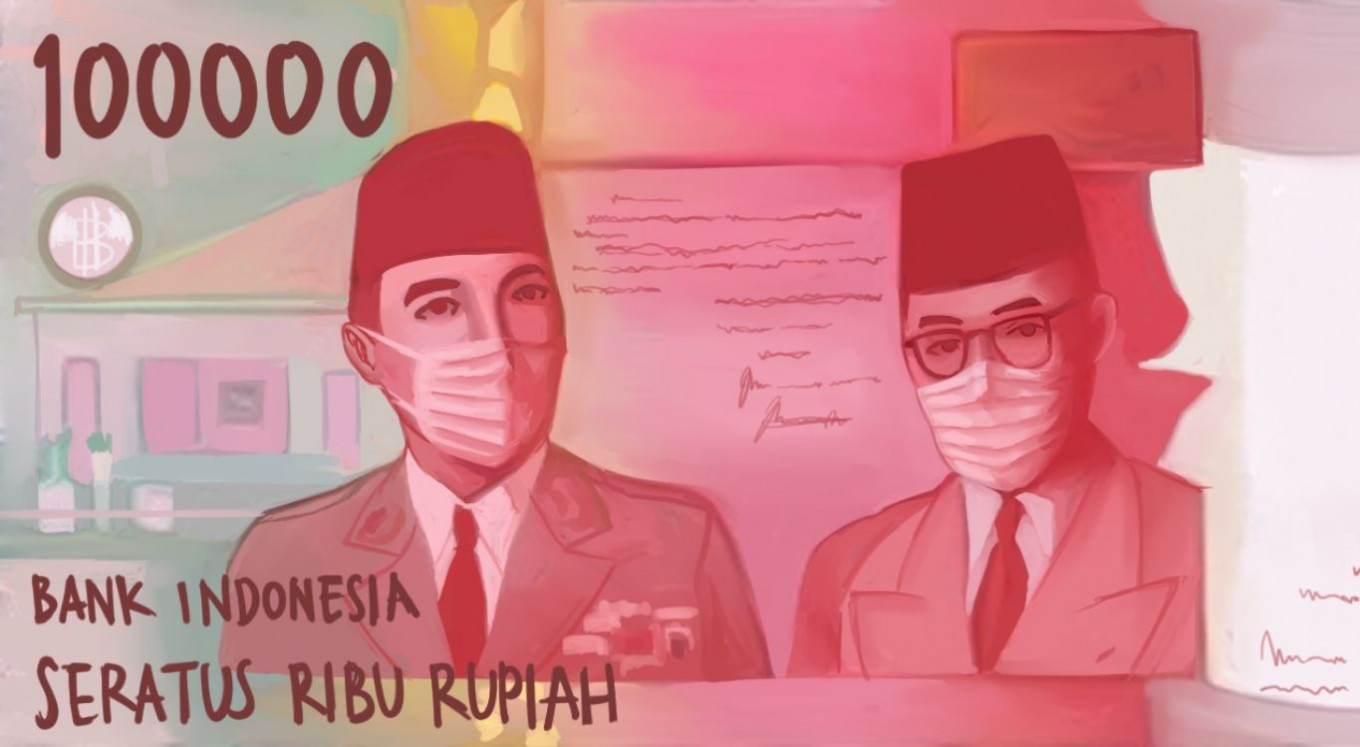Popular Reads
Top Results
Can't find what you're looking for?
View all search resultsPopular Reads
Top Results
Can't find what you're looking for?
View all search resultsSurge in infections haunts rupiah appreciation
The rupiah has appreciated by 4 percent in the last three months, shaving off some of its losses so far this year to only 1.86 percent.
Change text size
Gift Premium Articles
to Anyone
T
he rupiah exchange rate is likely to continue its appreciation trend, but experts say a surge in coronavirus cases and a delay in economic recovery could lead to a significant sell-off in Indonesian assets and hurt the currency.
Fitch Solutions expects the rupiah to remain stable over the next three to six months driven by the potential availability of coronavirus vaccines, continued management by Bank Indonesia, as well as anchored real yields because of low inflation.
“Even though it is likely the rolling out of the COVID-19 vaccine in Indonesia will take some time, […] we believe the rupiah will nevertheless be supported by the generally improved sentiment that the vaccine is likely to bring globally,” analysts at Fitch Solutions wrote in a note made available to The Jakarta Post on Friday.
“The second factor that will help retain rupiah stability is BI’s continued management of the currency,” they went on to say, adding that the stability of Indonesian real yields because of weak domestic inflation would further support the currency.
The rupiah exchange rate slightly appreciated by 0.11 percent to Rp 14,085 against the United States dollar during Friday's session closing. The currency has appreciated by 4 percent in the last three months, shaving off some of its losses so far this year to only 1.86 percent. It depreciated by around 18 percent at one point during the early days of the coronavirus outbreak in the country as foreign investors dumped risky assets.
Over the long run, Fitch Solutions projects the country’s currency will continue to strengthen to the average of Rp 13,500 per US dollar in 2022 driven by the normalization of the global economy and the fact that the rupiah remains undervalued. “We believe that over the long-term, the rupiah will be less vulnerable to rapid sell-offs in local currency.”
Fitch Solutions, however, warned that delays in the availability of COVID-19 vaccines, which might lead to a further surge in coronavirus infections and thereby slow economic recovery, could worsen investors’ sentiment toward Indonesian assets.
“Rising risk aversion could lead to a significant sell-off in Indonesian assets and thereby the rupiah,” it stressed.
BI Governor Perry Warjiyo said during the BI Annual Meeting on Thursday that the rupiah remained “fundamentally undervalued” and would continue to strengthen further to reflect its fundamentals driven by anchored inflation, a narrowed current account deficit and attractive yield spread.
“We will continue to maintain rupiah stability based on its fundamentals and market mechanism in 2021,” he said. “Monetary stimulus will continue in 2021 while the benchmark interest rate will remain low until inflation picks up.”
BI has cut the seven-day reverse repo rate five times this year to 3.75 percent, its lowest level in history, bought billions of dollars worth of government bonds both in the secondary market and through auctions, as well as eased lending rules to support the economy and the financial markets.
Indonesia has fallen into recession as the pandemic crushed economic activity, causing the third quarter’s gross domestic product (GDP) to shrink 3.49 percent after a 5.32 percent contraction in the previous three-month period. The government projects this year’s state budget deficit to soar to 6.34 percent of GDP as it allocates Rp 695.2 trillion in stimulus to strengthen the healthcare system and support economic recovery.
Bank Mandiri analysts noted that the rupiah’s strengthening was supported by the downward trend in the USD index as investors shifted to risky assets in emerging markets including Indonesia over the news of Joe Biden’s win in the US election and improvement in Indonesia’s economic data.
“The rupiah strengthening trend was driven by capital flow into the financial market and supported by good economic data such as consecutive trade surpluses and controlled inflation,” the analysts wrote in a note “Economic performance in the fourth quarter is estimated to improve further, thus supporting the optimism in the financial market.”
A recent Reuters poll of currency strategists revealed that over two-thirds of the analysts - 51 of 72 - who answered a separate question, expected the downward dollar trend to last at least until mid-2021. The remaining 21 said it would reverse before that, Reuters reported.
The greenback - which usually thrives in a risk-off environment - weakened around 3 percent last month and is down almost 6 percent this year, resulting in the currency's worst annual performance since 2017.










